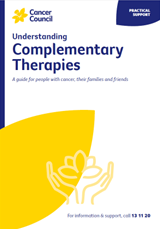Massage
What is it?
Massage involves moving (manipulating) muscles and rubbing or stroking soft tissues of the body. There are many different styles of massage. Oncology massage therapists are specially trained to adjust pressure, speed, duration and direction of strokes to provide a safe session for a person with cancer.
Why use it
All styles of massage aim to promote deep relaxation in tissue by applying pressure to muscles and pressure points. This helps to release both muscular and emotional tension. The style of massage used for people during or after cancer treatment will depend on the treatment they’re having. It may be helpful at any stage – from those newly diagnosed to people who have finished their cancer treatment.
Over the years, there has been a general concern that massage can increase the risk of cancer cells spreading to other parts of the body. However, there is no evidence that this happens.
Some types of massage can help reduce the symptoms of lymphoedema (swelling caused by a build-up of lymph fluid). This is called manual lymphatic drainage.
What to expect
Massage usually occurs in a warm, quiet room. It can be given while you either lie on a massage table or sit in a chair. The therapist uses a variety of strokes on different parts of the body. When performing massage on a person with cancer, therapists may need to adjust their pressure and avoid certain areas of the body.
Some styles of massage are done with you fully clothed; others require you to undress to your underwear so the therapist can use oil to move their hands over your skin more easily. The therapist may place pillows under different parts of your body so they’re supported. Let the therapist know if you need anything to feel more comfortable, such as a change in pressure or another blanket. You may like to close your eyes during the massage.
What is the evidence?
Many scientific studies have shown that oncology massage may help manage symptoms such as stress, pain, anxiety, depression and fatigue in people who have had chemotherapy or surgery for cancer.
Massage concerns for people with cancer
See an accredited oncology massage therapist or lymphoedema practitioner to ensure they know to avoid massaging near known areas of cancer, and understand how to adapt massage to specific safety concerns relating to cancer treatments.
Chemotherapy – This drug treatment affects the whole body. If you have a chemotherapy port, massage should not be done in this area. Some people who have chemotherapy experience tingling in their hands or feet (peripheral neuropathy), or may find they bruise or bleed easily, so should avoid deep massage.
Radiation therapy – The skin may be sensitive to touch after external radiation therapy. It may look red and appear sunburnt. If you are having radiation therapy, you should avoid massage to the treated area once any skin changes appear or your skin becomes sensitive. Massage oils may make already irritated skin feel worse.
Surgery – Recovery after surgery takes time, and it’s important to avoid massaging the area of the operation until wounds are healed and there are no other medical issues such as blood clots, infections or trapped pockets of fluid under the skin (seroma). Ask your surgeon when you can start scar massage after surgery. Gentle massaging with lotion can provide comfort and support.
Risk of lymphoedema – If you’ve had lymph nodes removed from the neck, armpit or groin during diagnosis or treatment, or if you’ve had radiation therapy to these areas, you may be at risk of developing lymphoedema. Consider seeing a trained lymphoedema therapist for massage therapy. If you have developed lymphoedema, massage therapies such as manual lymphatic drainage may help control the symptoms. Therapists not trained in treating lymphoedema should avoid the affected area. Visit Australasian Lymphology Association to find a registered lymphoedema practitioner.
For more on this, see Lymphoedema.
Bone fragility – Radiation therapy or medicines, or the cancer itself, may cause the bones to become more fragile. Care should be taken to avoid undue pressure.
→ READ MORE: Medicinal cannabis
More resources
Dr David Joske, Clinical Haematologist, Sir Charles Gairdner Hospital and PathWest, Chairman and Founder Solaris Cancer Care Foundation, Clinical Professor of Medicine, The University of Western Australia, WA; Australasian Integrative Medicine Association (AIMA); Dr Robert Blum, Clinical Director, Cancer Services, Bendigo Health, NSW; Sally Brooks, Senior Pharmacist, Medicines Information, Peter MacCallum Cancer Centre, VIC; Dr Suzanne Grant, Senior Research Fellow, NICM Health Research Institute, Western Sydney University, and Chris O’Brien Lifehouse, NSW; Prof Danforn Lim, Adjunct Professor and Advisory Board Member, NICM Health Research Institute, Western Sydney University, and Adjunct Professor, UTS, NSW; Christina Line, Statewide Services Senior Coordinator, Cancer Council WA; Jen McKenzie, Physiotherapist (Lymphoedema) and ESSA Accredited Exercise Physiologist, The McKenzie Clinic, QLD; Simone Noelker, Wellness Centre and Pastoral Care Manager, Ballarat Regional Integrated Cancer Centre, VIC; Dr Nirzari Pandit, General Practitioner, RACGP Specific Interests Integrative Medicine Group, NSW; Georgie Pearson, Consumer; Cris Pirone, Counsellor, Cancer Council SA; Dr Elysia Thornton-Benko, Specialist General Practitioner, and UNSW Research Fellow, NSW; Kirsty Trebilcock, 13 11 20 Consultant, Cancer Council SA.
View the Cancer Council NSW editorial policy.
View all publications or call 13 11 20 for free printed copies.
Need to talk?
Support services
Coping with cancer?
Speak to a health professional or to someone who has been there, or find a support group or forum
Looking for transport, accommodation or home help?
Practical advice and support during and after treatment
Cancer information
Dealing with the diagnosis
Common reactions to a cancer diagnosis and how to find hope
Explore our resource hub
Explore and download our booklets, fact sheets, podcasts, webinars and videos for people affected by cancer

